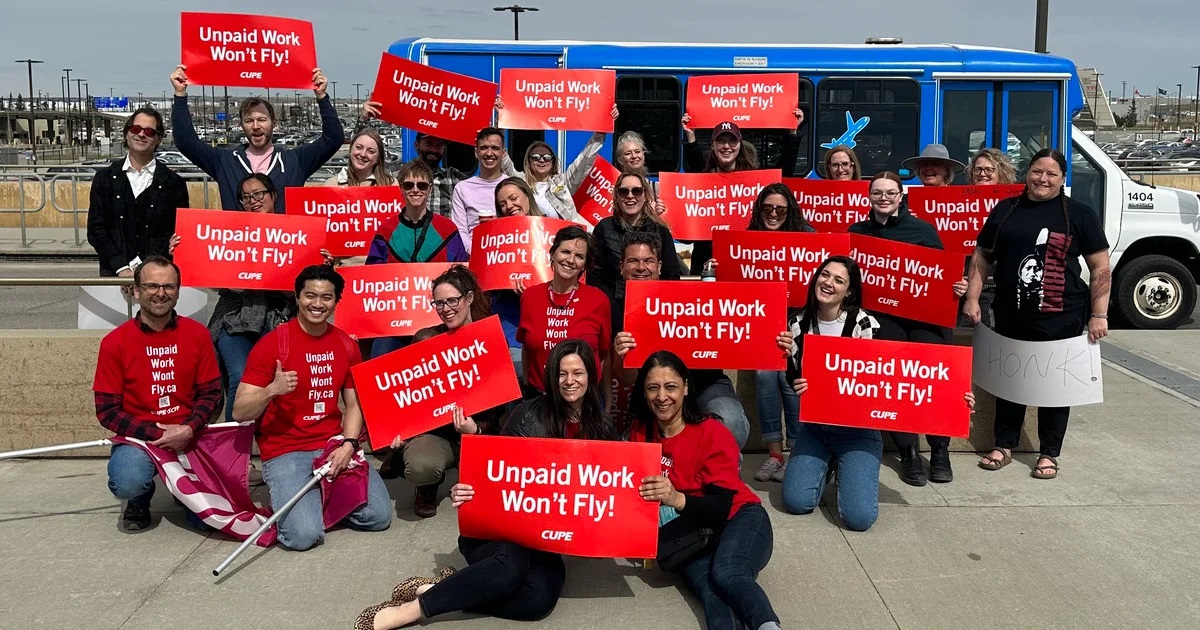
Over 2,100 airline attendants at Air Transat voted almost unanimously in favour of strike action last week, after years of poverty pay and job cuts.
The workers, represented by CUPE, are underpaid, understaffed, and standing up to an industry that has used the COVID-19 pandemic as an excuse to provide a worse service while pocketing corporate bailouts.
Eroding conditions for workers
Last week, 99.8 per cent of CUPE’s Air Transat Component workers voted to strike, after more than six months at the bargaining table. While Air Transat received nearly $900 million in government money during the COVID-19 pandemic, the company has fought hard to keep its workers understaffed and underpaid.
The starting salary for an Air Transat flight attendant is $26,577, well below the sort of income needed to live in a major city like Toronto, Montreal, or Vancouver—where the country’s airports are located. For this reason, over half of these workers have had to take on second or even third jobs.
Worse, the airline laid off 70 per cent of its workforce in March of 2020. Ironically, this came just two months after Forbes placed it on its list of Canada’s best employers. The airline also completely suspended regular service for two extended periods during 2020 and 2021, putting even greater financial stress on the few attendants who remained.
The company promised that these layoffs would be temporary, but as of today they employ only 2,100 attendants, compared to over 5,000 before the pandemic. Unsurprisingly, the lack of staff has led to an increased workload for attendants, including a chronic issue of unpaid work: on average, flight attendants work 35 hours of unpaid time every month!
Even as the company has started to turn a massive profit again – earning $756 million in Q3 of 2023 alone—they continue to cut jobs. In January of this year, they shut down their base at Vancouver International Airport, forcing over 200 workers to either relocate across the country or lose their jobs.
Facing poor pay and a high cost of living, with working conditions that only seem to get worse despite their employers’ increasing profits, it is no wonder that CUPE Air Transat workers voted so overwhelmingly to strike.
The crisis of private ownership in air travel
The potential strike is a symptom of the generalized crisis within the air travel industry, which has been particularly acute in Canada.
From 2020-22, airlines cynically used the lockdown as an excuse to cut down on expenses by reducing the quality of their services, all the while helping themselves to billions of dollars in taxpayers’ money. Air Canada, for instance, cancelled tens of thousands of flights over the course of the pandemic, then treated their executives to $10 billion in bonuses.
After sacrificing so much to keep the country running during the pandemic, and receiving nothing in return, workers are beginning to fight back. The near-strike of WestJet pilots in May was the first signal of a potential struggle, which has now spread to both Air Transat and Air Canada, whose pilots’ union triggered a clause ending their contract a year early to kickstart negotiations on a new deal.
Canada’s airline owners have clearly demonstrated that their interests are at odds with the needs of regular people. The anarchy of the profit-based capitalist market is to blame, and the only solution lies in the hands of the workers themselves.
Under a socialist planned economy, all airlines would need to be controlled and operated democratically by workers themselves. Under workers’ management, in place of capitalist management, we can guarantee all airline workers safe working conditions and decent pay and ensure that service is not undermined in the interests of profit.
We stand with Air Transat airline attendants in their fight for fair wages, an end to unpaid work, and an end to the continuous attacks on their livelihoods in the interests of wealthy shareholders. Solidarity with the airline workers! Strike until victory!

